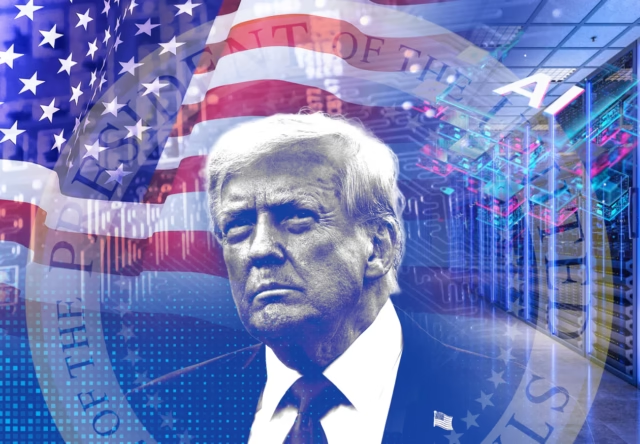President Donald Trump is set to unveil his AI Action Plan at an event in Washington D.C. on Wednesday. This marks his first major address on artificial intelligence since his second inauguration in January. The plan aims to outline the administration’s strategies, priorities, and concerns related to AI, a technology expected to significantly shape his term.
The AI Action Plan is intended to replace the previous administration’s AI executive order, which focused on mandatory safety reports and limiting bias in AI models. Trump repealed this order early in his term, citing concerns that it could hinder American innovation.
Trump’s AI Action Plan Prioritizes Infrastructure, Innovation, and Global Influence
According to a report from Time Magazine, Trump’s AI strategy is expected to be built on three main pillars: infrastructure, innovation, and global influence. These pillars aim to accelerate the development and adoption of American AI technology both domestically and internationally.
For infrastructure, the administration is reportedly planning to streamline permitting processes for AI data centers. This move addresses the growing energy demands required to train and operate AI models. Simultaneously, Trump is expected to propose modernizing the electrical grid and expanding energy sources to power these data centers.
Controversy Surrounds Regulations and the Definition of “Woke” AI
Trump reportedly plans to use the AI Action Plan to revive the conversation around blocking state AI laws, despite a previous federal proposition failing. This is intended to reduce barriers to innovation but could prevent states from implementing crucial safety standards.
One of the executive orders Trump is expected to sign aims to crack down on what he calls “woke” AI models. This order would require AI companies with federal contracts to ensure their AI models maintain neutral and unbiased language. The definition of “neutral” and the means of determining bias remain unclear and raise free speech concerns.
Big Tech Seeks Favourable AI Policies
The White House received over 10,000 public comments from various stakeholders regarding the AI Action Plan. Major AI developers like OpenAI, Google, Meta, and Amazon used this opportunity to advocate for policies favorable to their interests.
Many companies requested guarantees that training large language models on copyrighted material would be considered fair use. Meta, meanwhile, asked for protections for open AI models, which allow them to compete with the closed models offered by OpenAI and Google. Conversely, other groups urged the administration to increase investment in AI research outside of commercial entities.
While the specifics of Trump’s AI Action Plan remain to be seen, it’s unlikely to include the same safety and security reporting standards proposed by the previous administration. This could face opposition from lawmakers and the public who support AI safety standards.




















